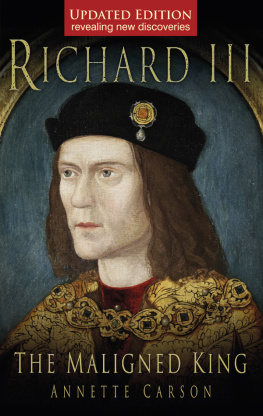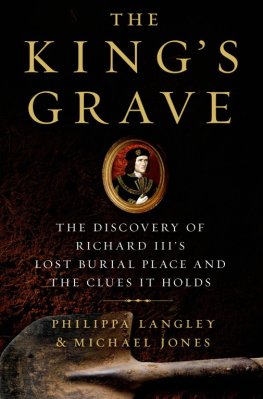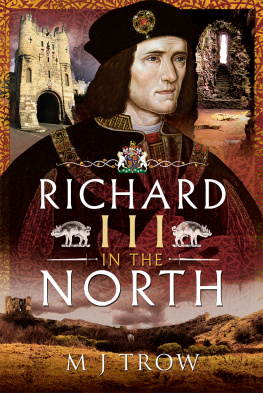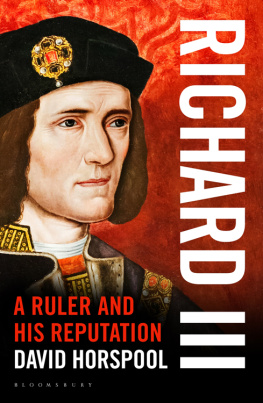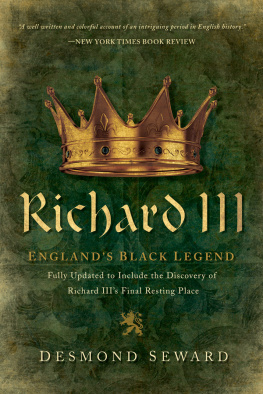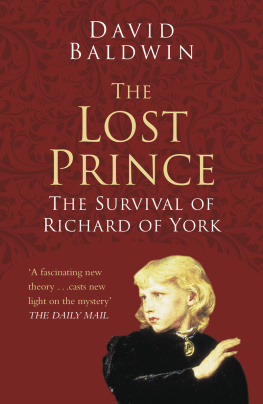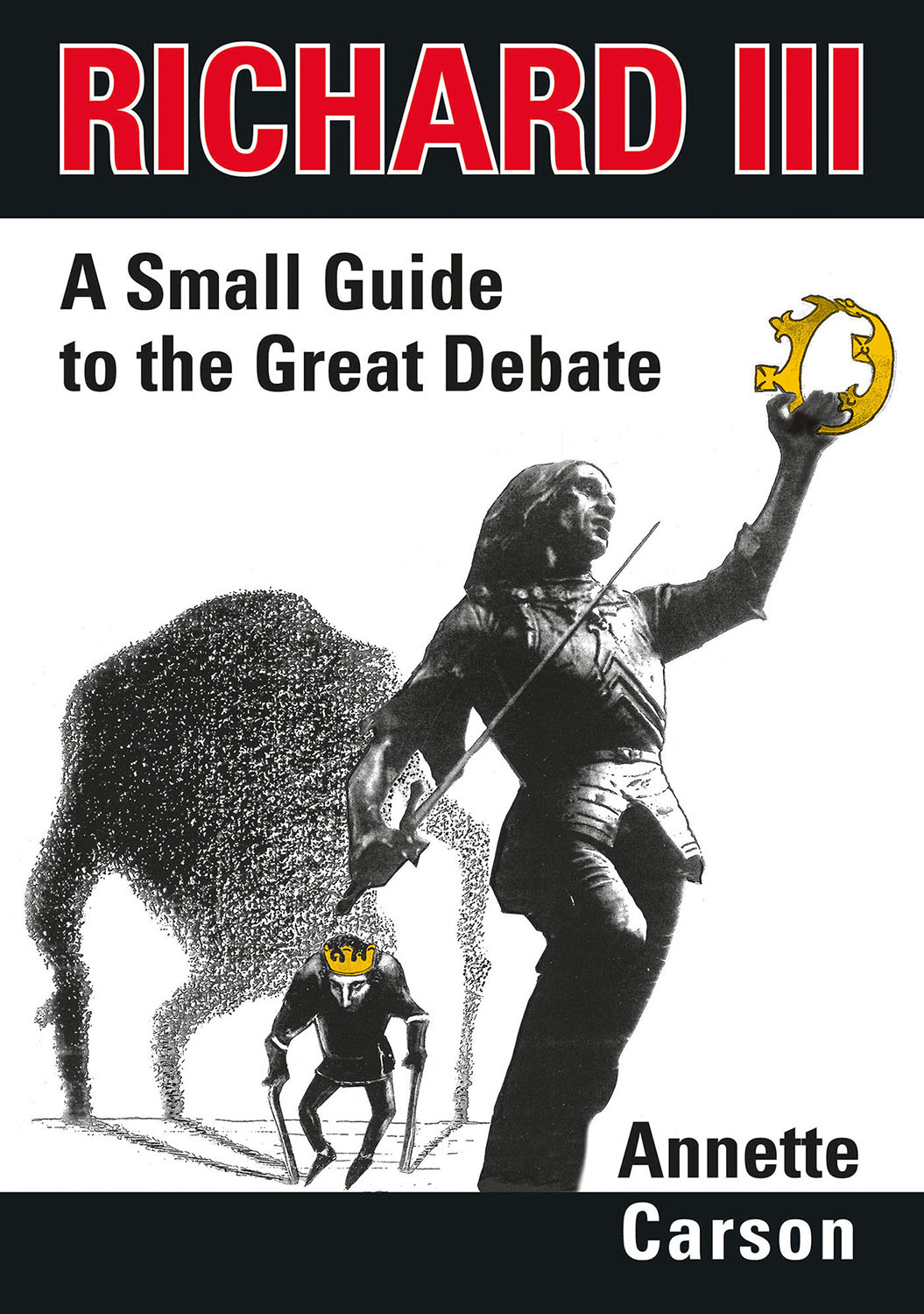Finding Richard III: The Official Account of Research by the Retrieval and Reburial Project (Ed.) (with J. Ashdown-Hill, D. Johnson, W. Johnson and P.J. Langley)
Camel Pilot Supreme: Captain D.V. Armstrong DFC
The right of Annette Carson to be identified as the Author of this work has been asserted in accordance with the Copyrights, Designs and Patents Act, 1988.
All rights reserved. No part of this book may be reprinted or reproduced or utilised in any form or by any electronic, mechanical or other means, now known or hereafter invented, including photocopying and recording, or in any information storage or retrieval system, without the permission
in writing from the copyright holder.
British Library Cataloguing in Publication Data.
A catalogue record for this book is available from the British Library.
1
Richard III Today
The recent dramatic discovery of Richard IIIs grave in Leicester gave rise to enormous media interest. The media were interested because of the huge and ongoing fascination of the general public with Richard III, both the man and the legend.
Fame feeds on itself. Newspapers and magazines were duly brimming over with articles, most of them reproducing the usual stories by the usual people who made up their minds about Richard years ago (newspapers seldom commission original research) and naturally they were peppered with quotations and pictures from Shakespeares play.
The television screen loves Richard because as a visual medium it can choose from myriads of vivid images to depict him. Plus of course theres never any shortage of people delighted to give their opinion on air, usually in the context of some overall theme or series, pronouncing their view on the person they imagine Richard III to have been. Yet Ricardian scholars are rarely given airtime to discuss the real, historical Richard, and as I write this, no seriously researched biographical documentary has ever been made.
Probably its considered that the introduction of sober facts would diminish the sensational aura that surrounds Richard III. The vocabulary is always dramatic, the presenters and scene-setting are studiedly theatrical, edgy, angled, playing to a chosen audience. A good example of this is the potted history presented by the tour guides at the Tower of London.
This raises an interesting question. Do we prefer our history as a series of easily digested statements, neatly pigeonholed? This king was bad/ruthless/tyrannical, this other king was ineffectual, another was challenged by his barons, another won wars, another carried out religious persecutions?
Alternatively, if history is more nuanced than this, should it be left to the professors and their academic research? Is it too dry and dusty to be enjoyable or comprehensible unless sexed-up or dumbed-down for popular consumption?
On the contrary, I think that the stories of past lives in past centuries are exciting, relevant and enlightening. Equally enlightening is to revisit what previous generations have made of our common history, and to discover those many truths that were unknown to past researchers.
One thing I cannot emphasize strongly enough when dealing with history: its vital to avoid looking back, you have to put yourself firmly in the past as if it is the present. We must be willing to do this just as we do with fiction which is not easy, since only a few non-fiction history books have the gift of bringing to life the strangely foreign world their characters inhabit.
Richards world was a feudal system in which rank, especially royal rank, commanded obedience. The vast majority of those who were ruled had the obligation to respect their betters, observe the laws and conventions, fight when conscripted, pray when expected, and remain dutiful and loyal to their masters.
The ruling classes had obligations in turn, and all things were governed by the king with advice from his council. Those who chose to play the Great Game of power, seeking to manipulate, challenge or overthrow their rulers, knew how dangerous a pursuit it was, with perilous outcomes (and often the axe) for those who lost.
When looking at the king himself it is vital to suspend moral sensibilities about the absolute power vested in mediaeval monarchy, where a kings person was the human embodiment of the realm, its people, its security and defence, its justice, its entire social order. Many traditional historians seem to sit in judgement on the autocratic rights of royalty five centuries ago, implying that they should (and could) conform to standards of ordinary mortals in more recent eras. This is not to discredit historians. But if each new generation fails to question its predecessors, then received wisdom will simply become solidified into orthodoxy, and fresh insights will be seen as heresy.
This is why I consistently emphasize two things when writing about Richard III: that we actually dont know as much as were led to think we know; and that its down to each of us to make up our own minds, not just believe what were told (by anyone, including me!).
Unless you have read his diary and unfortunately we didnt find one buried with him its necessary to face the fact that there will be a lot of unanswered questions. Almost everything weve been told about Richard III is hearsay, much of it unreliable. Richards reign may seem very familiar thanks to the lurid stories weve all heard, but these were told by writers of later generations employing the sudden new mushrooming of printing and publishing. During his lifetime no one wrote literature dramatizing the bloody exploits of previous kings and praising present ones. There were no theatres where playwrights could parade such characters on stage as heroes or villains, personified in flesh and blood by actors.
The Tudors are so much a part of our Merrie England tradition that its forgotten how they seized the throne over the bodies of thousands of English dead in a French-backed invasion. They had a lot to answer for, and one way of justifying their actions was to pretend that Richard was hated by his people because of his many crimes. They couldnt discredit his good governance, since sources including the Bishop of St Davids and the City Council of York indicate that his methods were admired; even in 1525 his laws were praised by the Mayor and Aldermen of Henry VIIIs London.
However, what the Tudors could do was vilify him personally, and in this they had the incredible luck to benefit from that new printing technology which, greatest of all ironies, Richard III himself had made laws to encourage.


